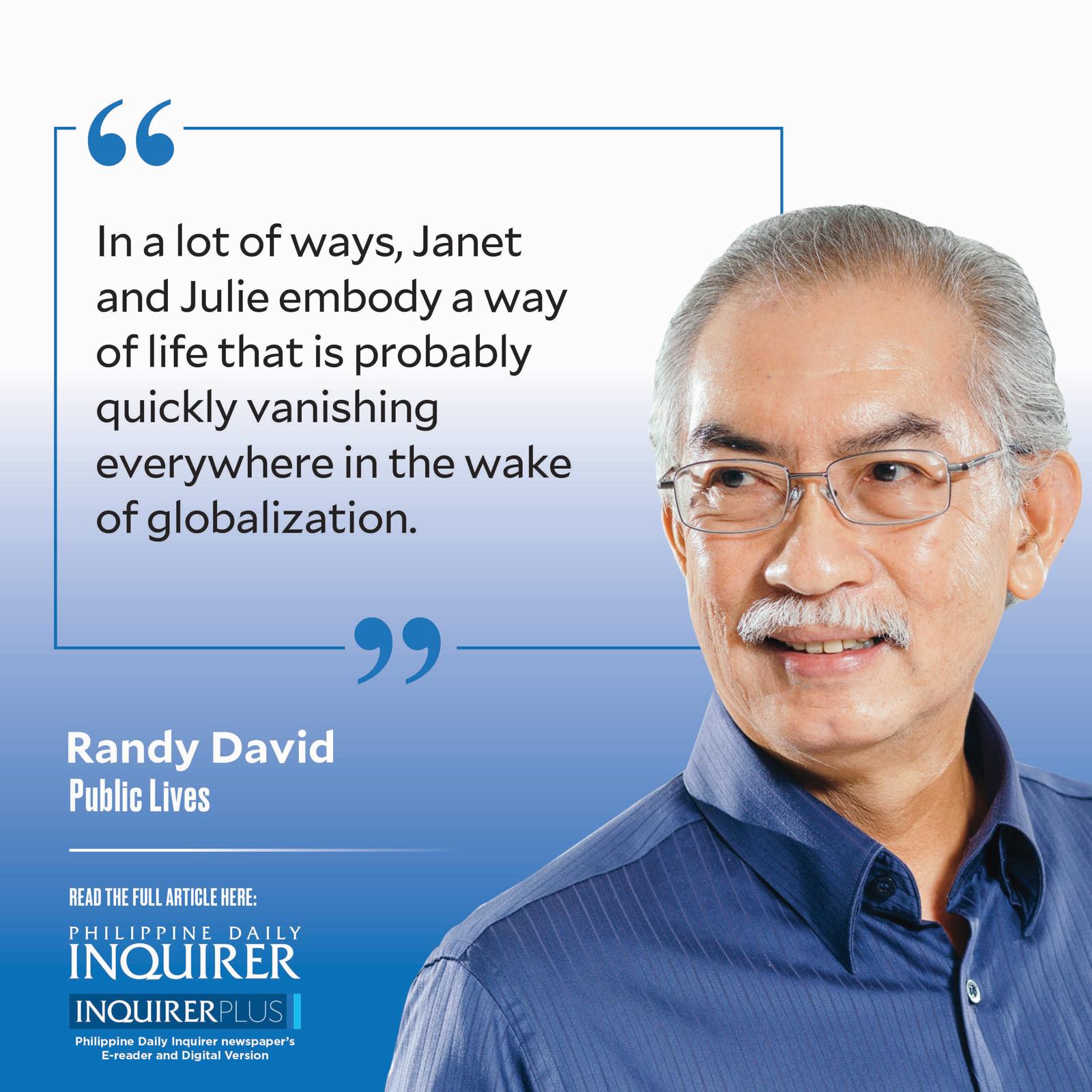A visit across time

This piece is not about time travel, though it may well be. It is, more accurately, about the precious experience of seeing people again, more than half a century after we first met them. It is about those rare events in our lives when, in full awareness of the remaining time we have, “everything can be brought into tune with everything else.”
Almost a year ago, I wrote about a letter marked “personal” that I received from an address in England. As I recounted in that column, (“A letter across time,” 3/19/23), I didn’t immediately recognize the name of the sender. Sent by what we now call “slow mail,” the airmailed letter landed in my pigeonhole at the sociology department in the University of the Philippines Diliman six months after it was posted! I assumed it was buried in the pile of mail that had accumulated at the Quezon City main post office during the pandemic. Attached to Julie Davies’ one-page letter was a photocopy of a group photo that showed me and my wife Karina in the company of mostly elderly English people. I had no recollection of that photograph. But at once, I recognized Karina’s birthday dress, one of our first purchases in England, and the dark green corduroy blazer I was wearing which we bought during a brief stopover in Hong Kong, on our way to London.
Neither did any of the beaming British faces in that picture look familiar—except those of the two young kids seated in front. One of them was Julie, aged 8 at that time, and her sister Janet, aged 10. Suddenly, memories of that coach tour to Bournemouth, England came flooding back like faded footage from a long-forgotten video.
Karina and I were in our early 20s and were newly married. It was our first year in England as graduate students on a Rockefeller fellowship grant. The summer term had just ended, and we were raring to get away from our books and the fickle Manchester weather. We wanted to see the English countryside, but we were not confident about going backpacking the way young British students traveled during the summer break. The next best option, we thought, was to join a discounted coach tour primarily designed for the retired and elderly. It was there that we first met the two sisters. Last month, 54 years later, the two girls, now in their 60s, paid us a sentimental visit. Their first stop was the grave of Karina, who, as I soon realized, had left an indelible mark on them. Year after year, they recreated the memory of their brief encounter with Karina by teaching their own children and grandchildren what they learned from her. For context, I invite the reader to go back to that column from last year (https://tinyurl.com/467792uh). For almost a year after Julie wrote me that slow-mail letter, we communicated through Gmail, Facetime, and WhatsApp. Last December, on Boxing Day (celebrated in Britain on the day after Christmas), Julie and Janet introduced me to the large Gornall family, which includes their respective families as well as those of their two younger brothers. They struck me as a close-knit family, just like ours. I conveyed my open invitation for them to visit the Philippines.
In early January this year, Julie messaged me asking if late February or early March would be a good time to visit. As they told me later, the sale of their late father’s house had left them a little extra cash that they could use for any purpose on their bucket list. Before I had a chance to grasp the seriousness of their plan, they had already booked their flights: arriving on Feb. 22 and departing on March 1. When I proposed that they might want to extend their stay a couple more days so they could see other parts of the country, they emphatically said that they really just wanted to see me and my children and the house where Karina and I lived. A visit to her grave was indeed top in their program.
My granddaughter Julia, now 23 (the same age as Karina when we went on that tour), volunteered to show them Fort Santiago and Intramuros, and later the National Museum. They had breakfast with my brother Bishop Ambo, and lunch with my sisters and other brothers in Betis. I brought them to see the stone houses at Las Casas Filipinas de Acuzar in Bataan. As their visit happily coincided with the anniversary of the Edsa People Power Revolution, in which Karina and I had actively participated, I brought them to the Club Filipino event commemorating Cory Aquino’s 1986 accession to the presidency.
We had long conversations about their own lives in those intervening years when we had no contact. They told me that they began working at 16, as soon as they finished secondary school, and that they had both married early: Julie at 19 and Janet at 21. That they found no need to go to university was not unusual for their generation.
As Julie reminded me, they are from “farming stock,” acquiring the kind of training they needed as they worked in various occupations and volunteered for essential tasks in their local community. They have both served, at one time or another, as bursars at their local schools, as civil registrar, as community rehabilitation officer for young offenders, or as part-time staff at the local pub. On the side, they make handicrafts and different kinds of fruit jams. They keep the memories of their parents alive and dote on their grandchildren.
In a lot of ways, Janet and Julie embody a way of life that is probably quickly vanishing everywhere in the wake of globalization.
—————-
public.lives@gmail.com




















